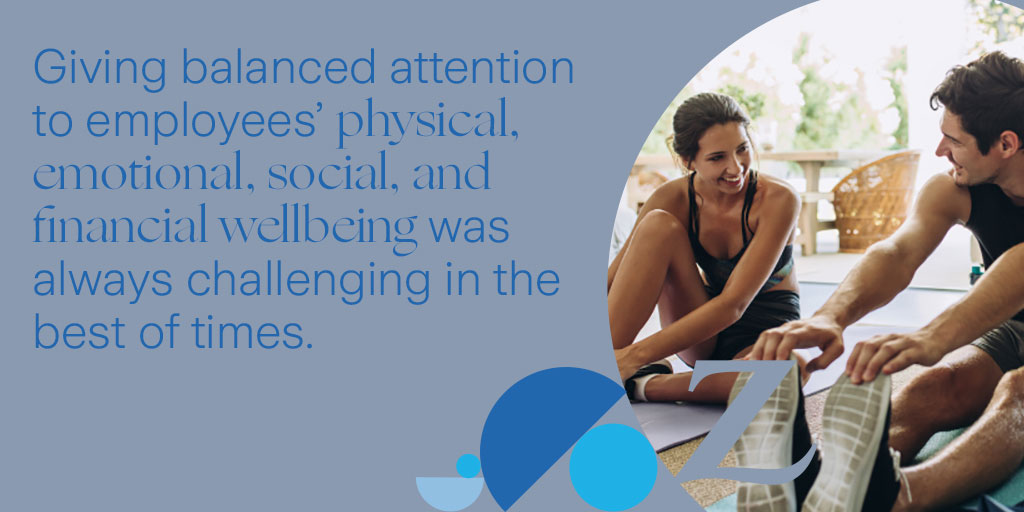The pandemic has shown why employers must prioritize health and wellbeing
Future of workArticleFebruary 4, 20225 min read
COVID-19 represents an unprecedented challenge to the health and wellbeing of employees. But companies can continue to thrive by adopting a positive approach to employee wellbeing, both in and out of work.
Mental health has taken on enhanced importance since COVID-19. Workers’ emotional wellbeing was already an issue of great concern to companies, given the risks and uncertainties inherent in a changing employment landscape. The stresses associated with COVID-19 – such as job insecurity, health risks, caregiving responsibilities and adjustments to remote working – can have repercussions on performance and achievement. Wellbeing more than ever is now an integral part of the relationship between employer and employee.
In our published report “Shaping a brighter world of work: The employer outlook report”, showed that employers are aware of the need for a holistic approach to wellbeing but many are still working to define and deliver on it. This has become an even greater challenge during the pandemic, when the boundaries between work and home are increasingly difficult to define.
The employer outlook report and along with, “Shaping a brighter world of work: The case for a new social contract”, draw on insights from Zurich Insurance Group (Zurich)’s five-year research collaboration with the Smith School of Enterprise and the Environment at the University of Oxford.
A consistent theme in the Zurich-Oxford research has been to ask how employers can accommodate, in a holistic manner, the physical, emotional, social, and financial wellbeing of their workforce. All these issues have taken on enhanced significance during the pandemic. Ensuring that the workplace, whether in an office, factory or at home, is a healthy environment must be given a high priority in a company’s global strategy. Our report suggests that companies will look to increasingly monitor their employees’ wellbeing, ensuring that they work in healthy environments and are themselves healthy.
Helene Westerlind, CEO of Zurich LiveWell, says employees should have high expectations of their employers. “The fundamental aspect of caring about your people, wanting them to live happier and healthier makes sense not only to the individual but also for the business performance.”
“People who are cared for at work and feel appreciated will perform better, experience less absenteeism and presenteeism, be more productive and give an overall greater performance back to you as an employer. It’s a win-win-approach.”
One question confronting organizations who manage teams remotely is how far to extend their responsibility for their workers’ overall wellbeing, notably their mental health. Now that the boundaries between the office and the home have significantly blurred, companies must determine whether or how to manage people’s wellbeing outside of “working hours,” however that’s defined.
“The fundamental aspect of caring about your people, wanting them to live happier and healthier makes not only sense to the individual and person as such but also for the business performance.”
The Zurich-Oxford research indicates that employers and employees alike are aware that financial health is central to overall wellbeing. The question of how employers can most effectively contribute to this has been yet another recurring theme in our Income Protection Gap and Workforce Protection projects.
Education about financial literacy is increasingly recognized as a key issue. This will enhance their ability to manage their money effectively for a lifetime of financial wellbeing, including understanding everyday financial products and benefits that are available to them in their workplace, such as pensions and various types of insurance. While employers had often seen a rather limited role for themselves in offering financial education and benefits advice, this had been changing already prior to the onset of COVID-19.

“As state systems become more under pressure, employees are seeking more support from their employers,” says Wendy Liu, Global Head of Corporate Life and Pensions at Zurich. “This doesn’t necessarily mean financial support. It could be guidance and access to the appropriate products and services.”
Even though the companies in our survey of medium and large employers in six countries (Australia, Brazil, Germany, Spain, Switzerland and the UK) gave their employees’ level of financial literacy a median score of 7 out of 10, the majority still saw room for improvement, with two-thirds (68 percent) saying they believed their workforce would benefit from education or communication around financial wellbeing. Their employees seemed to be aware of this need, too, as 57 percent of companies said they had experienced greater demand over the past three to five years for advice about financial wellbeing.
“As state systems become more under pressure, employees are seeking more support from their employers.”
Giving balanced attention to employees’ physical, emotional, social and financial wellbeing was always challenging in the best of times. Now, with the added stresses of the fallout from the pandemic, it has taken on even greater urgency and importance. But with employees now more likely to take a greater interest in their benefits, employers have a great opportunity to engage with them on all matters related to wellbeing.






